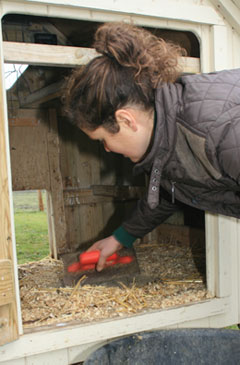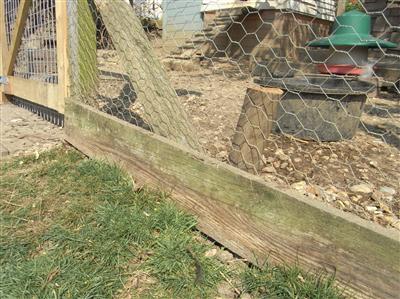Foxes are the number one predator of our chickens in the U.K (unless of course you live on the Isle of Man where there are no foxes!)

Foxes usually rip the heads off chickens and will kill as many birds as they can in a frenzy if they manage to get into a run or coop. Foxes usually get into a run by digging and squeezing under a fence or by going over the top of a fence. Fences need to be buried at least 8 inches deep with the wire then curled flat outwards by another 8 inches. They can clear a 5 foot fence with ease. Remember foxes are more like cats than dogs and can jump!
Foxes can also tear rabbit wire fences with their teeth – it is best to keep fences taught and ideally use the I inch rectangular wire as this is thicker, stronger and they can’t get their teeth into it.
They will squeeze through the smallest of gaps… but don’t take my word for it, this short clip shows him in action!
Foxes usually work alone but towards the end of summer, sometimes the Vixen will hunt with her cubs to teach them.
When are your chickens at risk?
Foxes are generally nocturnal creatures, hunting under the cover of darkness; however when there is a large population of foxes or a shortage of food as is often found in the urban environment, they can start to become a pest during the daytime. Young cubs that are just finding their own food often stay out until mid morning, I frequently see them playing on the bales of hay in the fields near my home in late June and July and from time to time they will come into my garden.
The winter is obviously a dangerous time for chickens when food is short, however the time when most of us get caught out is June to August. Cubs are learning to hunt on their own, will often come early evening or morning when it is light and don’t have the fear to stay away from us.
If your chickens free range, a fox may make a dash, grab a chicken and run off. During these risky times, you may need a small secure run to house them when you are out but there are other options. Electrified poultry netting works wonders at keeping them safe in a large area and you may be able to speak to your local game keeper if you have a problem fox that is very determined.
Do you have any advice on Foxes? Please leave a comment below if you do.






Hi, great site. I have my little flock of Light Sussex hens and a cock on my allotment. We have had problems with foxes but are using human hair in mesh bags suspended at various points around the run. The next trick is slightly gross but seems to work, we basically use our urine to spray around the border of the run marking our territory. Foxes apparently hate this!
Hope this is useful:)
Thanks
Andy Sewell
That’s very interesting – without wishing to tempt fate, can you report the success of the hair and spraying? We have only recently acquired four chickens, who have a long run at the top of our garden, and although never having seen a fox here before, were surprised by a young one in the garden yesterday. We’ve made with the urine spray already, and are keeping our fingers crossed, but it would be nice to know of others’ experience.
It was quite a shock to see the fox, but it’s good to know that the adults are more nocturnal. The hen-house is pretty solid, but I might put a catch on the nest box lid!
Hi really enjoyed your site, very informative, a great help. I am having a big problem with a badger at the moment, that is making a nightly visit to my hens. It managed to catch and kill one, It has not managed to get in since, but has been trying its hardest. Is the anything that i can do too? I do not wish to harm the badger.
Thanks very much. Paula
Hi Paula,
Badgers are very strong and can be very destructive, trying to get in. I would firstly consider reinforcing your chicken house – perhaps ideally with metal plates around the weak areas (like you would find on the bottom of doors in offices) so for example the pop hole and bottom of the main door. Even adding mesh would help, anything that will stop the wood from breaking up on the corners / edges.
If he can’t get in, he may eventually give up. He must be hungry as they won’t normally bother unless food is scarce. At this time of year, he will also be feeding young.
If possible, I would also consider an electric fence wire. This can be very simple: a wire 6 inches off the ground and one at nose height would stop him digging or touching the house / run. It’s hard to comment without seeing your set-up but have a look at my page on Electric Fencing Chickens which may help.
I had 4 of my chickens taken on Friday 13th (Jan 2012) by a fox. The main area of my coop is made with welded mesh but we made an extension with chicken wire which we have had for two years with no trouble from fox attack. We have never had a fox try and get in the coop before until that Friday. He tore through the chicken wire and made a very small hole. Can’t believe he managed to get back through the hole with the chickens as one of them was quite big. We had piles of feathers around the garden in various places but that’s all, no sign of any carcasses. We have now ordered stronger welded mesh and temporarily made the coop as secure as possible with old doors around the perimeter. My husband has urinated around the garden as been told this helps. We still have 12 chickens left but fortunately they were in a seperate part of the coop. Every morning I am worried that the fox has been back. I do let them out in the day when I am home but am now terrified the fox is just waiting in the bushes ready to pounce. One trick a fellow chicken keeper told me was to play a radio in the garden whilst the chickens are out by themselves, one with loads of talking to frighten away the fox. Don’t know if this works but worth a try! Anyone got any other tips?
Sorry to hear this. It’s a typical fox attack and he will come back again and again to try again. Have you considered electric poultry netting or an electric fence? It works really well for me. The urine is a bit of a myth, once they get used to it, they will not pay any attention to it. The same with the radio. Think how we have urban foxes that come into our gardens… There are various devices you can buy that will activate when the fox is detected (flash / make a noise) – but again if the fox is determined, he will get used to this. The radio or a flashing road light can work well – but only in the short term. If you can’t trap the fox in a cage and dispatch it humanely, then the only option is to secure your chickens – the electric wire or electric poultry netting being the easiest over a large area.
I don’t have any foxes or badgers in my small very VERY hillbilly county, but, we do have cayotes. Does the info about foxes apply to cayotes too?
We don’t have Cayotes in the UK and I have no experience of them, but I’m sure many of the principles of having a secure run would apply.
Wondering if anyone has any personal experiences to share on the ‘Foxwatch’ sonic repeller? I’ve read some positive reviews on it, any negative? I understand that the 9volt battery doesn’t last long, but there is an option of a mains adaptor. Any other cons?
Hi what is the best way to secure hens from foxes and do you have to put wire mesh underground?
Many thanks lizzie
There is no one ‘best way’ but the usual methods involve burrying wire in the ground, putting the edge of the run onto hard standing (slabs or bricks) or using an electric wire or electric poultry netting. Each has its own place. I wouldn’t for example burry wire in a field run, I’d use an electrified wire, I’d use electric poultry netting on a large lawn and I’d bury wire in a medium sized garden run. If I had a fixed small pre-fabricated run, I would consider building a 1 brick high wall around the base to stand the run on (and fill with wood chips that can be changed regularly).